
Selecting a site plan company is a nuanced process. It’s not just about finding the lowest bidder—it’s about expertise, local knowledge, and a commitment to responsive service. Here are the most important factors to weigh:
1. Credentials and Licensing
Check professional qualifications: The company should be licensed in your state and have certified engineers or designers on staff. These credentials ensure familiarity with local codes and the technical skill to create compliant plans.
Ask about insurance: Errors and omissions insurance protects you if mistakes occur. It’s a sign of professionalism and responsibility.
2. Local Experience and Reputation
Look for local expertise: Septic requirements vary dramatically by region due to differences in soil, climate, and regulations. A company that regularly works in your county will know what inspectors look for and can anticipate potential issues.
Seek recommendations: Ask your builder, neighbors, or local real estate agents for referrals. Online reviews can offer further insight, but direct feedback from past clients is invaluable.
3. Range of Services
Comprehensive offerings: The best companies offer end-to-end service, from soil testing and percolation studies to system design and permitting assistance. This streamlines the process and reduces the risk of miscommunication.
Customization: Every property is unique. A quality site plan company will tailor its design to your lot’s size, slope, and soil while considering your household’s size and future needs.
4. Communication and Responsiveness
Clear communication: You want a partner who explains the process, sets expectations, and promptly answers your questions. Ineffective communication can lead to delays, misunderstandings, and costly errors.
Project timeline: Ask about typical turnaround times and how they handle permitting delays or revision requests. A transparent schedule helps you plan your project with confidence.
5. Transparent Pricing
Detailed quotes: Don’t settle for vague estimates. A reputable company will provide a detailed breakdown of costs, including soil testing, design, permit submission, and any possible extra fees.
Value over price: Cheapest isn’t always best. Consider the quality of service, expertise, and long-term reliability when comparing quotes.
For more information, contact Morse Engineering and Construction.
